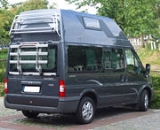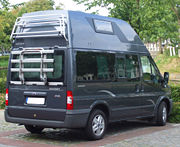
Westfalia
Encyclopedia

Volkswagen
Volkswagen is a German automobile manufacturer and is the original and biggest-selling marque of the Volkswagen Group, which now also owns the Audi, Bentley, Bugatti, Lamborghini, SEAT, and Škoda marques and the truck manufacturer Scania.Volkswagen means "people's car" in German, where it is...
camper vans
Volkswagen Westfalia Campers
Volkswagen Westfalia Campers were conversions of Volkswagen Type 2, also known as Transporter or Micro-Bus, from the early 1950s through 2003. Volkswagen subcontracted the modifications to the company Westfalia-werke in Rheda-Wiedenbrück.-Types:...
. It is named after Westfalia-Werke, the contractor that built the vans, which is headquartered in the town of Rheda-Wiedenbrück
Rheda-Wiedenbrück
Rheda-Wiedenbrück is a town in the district of Gütersloh, in North Rhine-Westphalia, Germany.-Geography:Rheda-Wiedenbrück is located on the river Ems, approx. 10 km south-west of Gütersloh.-Neighbouring municipalities:* Oelde* Herzebrock-Clarholz...
located in the Westphalia
Westphalia
Westphalia is a region in Germany, centred on the cities of Arnsberg, Bielefeld, Dortmund, Minden and Münster.Westphalia is roughly the region between the rivers Rhine and Weser, located north and south of the Ruhr River. No exact definition of borders can be given, because the name "Westphalia"...
region of Germany
Germany
Germany , officially the Federal Republic of Germany , is a federal parliamentary republic in Europe. The country consists of 16 states while the capital and largest city is Berlin. Germany covers an area of 357,021 km2 and has a largely temperate seasonal climate...
.
Westfalia-Werke also converted non-VW vans, and produced trailers and other products, but they were best known for their Volkswagen camper conversions
Volkswagen Westfalia Campers
Volkswagen Westfalia Campers were conversions of Volkswagen Type 2, also known as Transporter or Micro-Bus, from the early 1950s through 2003. Volkswagen subcontracted the modifications to the company Westfalia-werke in Rheda-Wiedenbrück.-Types:...
. Westfalia began converting Volkswagen
Volkswagen
Volkswagen is a German automobile manufacturer and is the original and biggest-selling marque of the Volkswagen Group, which now also owns the Audi, Bentley, Bugatti, Lamborghini, SEAT, and Škoda marques and the truck manufacturer Scania.Volkswagen means "people's car" in German, where it is...
buses in 1951. Their famous "pop-top" package was added later, and became very popular on the second-generation VW Bus from 1968–1979, its successor the Vanagon, and then the T4 EuroVan
Volkswagen Eurovan
The Volkswagen Transporter T4 is a van produced by German automaker Volkswagen Commercial Vehicles between 1990 and 2003, succeeding the Volkswagen Type 2 and superseded by the Transporter T5....
, which was discontinued in 2003. This design also inspired many imitators, with dozens of other companies worldwide offering poptop van conversions. Therefore, not all pop-top Volkswagens are Westfalia conversions (although in the U.S., the Westfalia conversion was by far the most common). Conversely, not all Volkswagen Westfalia conversions had poptops or cooking facilities. Volkswagen offered a "Weekender" package in the 1970s with a Westfalia interior but no poptop. Later, some Vanagon conversions were offered with a pop-top and interior table, but lacked cooking facilities and instead included a luggable 12 volt refrigerator.
In 1999, DaimlerChrysler purchased a 49% stake in Westfalia-Werke's van conversion division, and in 2001 absorbed the remaining 51%. Of course, since DaimlerChrysler is a Volkswagen competitor, this spelled the end of the Volkswagen-Westfalia partnership. While Volkswagen still offers pop-top camper conversions in Europe, they now do have another supplier to do the conversions. Meanwhile, Westfalia now makes high-roof (rather than pop-top) factory camper conversions for Mercedes vans (distributed in the U.S. by Airstream
Airstream
Airstream is a brand of luxury recreational vehicle manufactured in Jackson Center, Ohio, USA. It is currently a division of Thor Industries. The company, which now employs fewer than 400, is the oldest in the industry. Airstream trailers are easily recognized for their distinctive rounded...
and badged as Dodge Sprinters). They also provide automotive accessories to BMW, including trailer hitches.
In 2008, a management buyout occurred and Westfalia Van Conversion is now an independent entity. It still converts some vehicles for major car manufacturers which sell them through their own networks (such as the Ford Nugget) but also markets conversions through its own network of RV dealers. These models include the Ford-based Big Nugget, VW-based Sven Hedin and the Michelangelo. This vehicle uses a Fiat Scudo chassis and is designed to be a major competitor to the Volkswagen California.
On January 28, 2010, Westfalia-Werke filed for bankruptcy, citing a 40 percent drop in sales. According to the filing they would like to keep doing business while they restructure.
External links
- http://www.westfalia-enterprises.com
- Westfalia Van Conversion.
- camperize.com - DIY camper conversion info
- dutch nugget register - unofficial Dutch website of nugget owners

